Doctoral Project:
Mythological Migrations: Imagining Queer Muslim Utopias, Aalto University, Espoo, 2017 - 2025
Mythological Migrations: Imagining Queer Muslim Utopias - Artistic and Curatorial Strategies of Collaboration, Collective Resistance, and Coalition Building is a multidisciplinary doctoral dissertation that examines formations of queer identity, resistance, and community in Muslim migratory contexts through contemporary art practice. Set against the background of rising Islamophobia, racism, anti-immigrant sentiments, homophobia, and transphobia in the west over the last two decades, the project seeks to expand critical queer Muslim migratory perspectives and challenge the prevalent belief that Islam and liberal discourses on gender and sexuality are mutually incompatible. The thesis builds upon transnational feminist and queer intersectional scholarship alongside traditions of translation, interpretation, and innovation in Islamic art and cultural histories to disrupt dominant western-centric constructions of queerness and foreground the representation of non-heteronormative gender and sexual identities from diverse positionalities.
The dissertation comprises two artistic components: Chapter 1: The Nightclub (2019) and Chapter 2: The Darkroom (2020). The artistic components are accompanied by a monograph that offers critical and theoretical reflections on the presented artworks, films, and discussions, furthering diverse perspectives on queer, Muslim, racialized, and immigrant gendered and sexual positionalities.
The doctoral thesis was successfully defended on December 4th, 2025, and awarded a grade of pass with distinction. Additionally, the monograph was selected for Art Theses (formerly Aalto Arts Books) and is published by Aalto University. It can be purchased from the Aalto University shop.
The dissertation comprises two artistic components: Chapter 1: The Nightclub (2019) and Chapter 2: The Darkroom (2020). The artistic components are accompanied by a monograph that offers critical and theoretical reflections on the presented artworks, films, and discussions, furthering diverse perspectives on queer, Muslim, racialized, and immigrant gendered and sexual positionalities.
The doctoral thesis was successfully defended on December 4th, 2025, and awarded a grade of pass with distinction. Additionally, the monograph was selected for Art Theses (formerly Aalto Arts Books) and is published by Aalto University. It can be purchased from the Aalto University shop.
Supervisor and Advisor: Professor Mira Kallio-Tavin, University of Georgia, USA.
Advisor: Jeuno Kim, Royal Danish Academy of Fine Arts, Copenhagen.
Preliminary Examiners for Chapter 1: The Nightclub: Annette Markham, PhD, Professor of Media Literacies and Public Engagement, Department of Media and Culture Studies, Utrecht University, The Netherlands & Saara Hacklin, PhD, Chief Curator of Collections, Museum of Contemporary Art Kiasma, Finland.
Preliminary Examiners for Chapter 2: The Darkroom: Lena Séraphin, DA, Post-doctoral Researcher, Faculty of Education and Welfare Studies, Åbo Akademi University, Finland & Saara Hacklin, PhD, Chief Curator of Collections, Museum of Contemporary Art Kiasma, Finland
Preliminary Examiners for the monograph: Gayatri Gopinath, PhD, Professor, Department of Social and Cultural Analysis; Director, Center for the Study of Gender and Sexuality, New York University, USA & Kareem Khubchandani, PhD, Associate Professor, Department of Theatre, Dance, and Performance Studies; Studies in Race, Colonialism, and Diaspora, Tufts University, USA.
Opponent: Gayatri Gopinath, PhD, Professor, Department of Social and Cultural Analysis; Director, Center for the Study of Gender and Sexuality, New York University, USA.
The project was supported by the Kone Foundation, Finland.
Preliminary Examiners for Chapter 1: The Nightclub: Annette Markham, PhD, Professor of Media Literacies and Public Engagement, Department of Media and Culture Studies, Utrecht University, The Netherlands & Saara Hacklin, PhD, Chief Curator of Collections, Museum of Contemporary Art Kiasma, Finland.
Preliminary Examiners for Chapter 2: The Darkroom: Lena Séraphin, DA, Post-doctoral Researcher, Faculty of Education and Welfare Studies, Åbo Akademi University, Finland & Saara Hacklin, PhD, Chief Curator of Collections, Museum of Contemporary Art Kiasma, Finland
Preliminary Examiners for the monograph: Gayatri Gopinath, PhD, Professor, Department of Social and Cultural Analysis; Director, Center for the Study of Gender and Sexuality, New York University, USA & Kareem Khubchandani, PhD, Associate Professor, Department of Theatre, Dance, and Performance Studies; Studies in Race, Colonialism, and Diaspora, Tufts University, USA.
Opponent: Gayatri Gopinath, PhD, Professor, Department of Social and Cultural Analysis; Director, Center for the Study of Gender and Sexuality, New York University, USA.
The project was supported by the Kone Foundation, Finland.

Chapter 1: The Nightclub
Commissioned by Publics for Today Is Our Tomorrow Festival, Club Kaiku, Helsinki, Chapter 1: The Nightclub is a one-night multidisciplinary exhibit that addresses exclusionary histories in European culture that target immigrants and bodies of colour.
13 September 2019
Photographs courtesy: Aman Askarizad, Kush Badhwar, and Joni Korhonen, 2019
Program:
Premiere of Journey to the CharBagh
A film by Abdullah Qureshi, with Danai Anagnostou as Producer, and Directors of Photography: Hadi Rehman and Kerttu Hakkarainen.
Performance by Meera Band
Classical music; covers of Fairuz, Dalida, and Warda Al Jazairia
Where are you from?
A film by Tamara Al-Mashouk
Alif is for Awakening
A performance by Zulfikar Ali Bhutto
Premiere of Journey to the CharBagh
A film by Abdullah Qureshi, with Danai Anagnostou as Producer, and Directors of Photography: Hadi Rehman and Kerttu Hakkarainen.
Performance by Meera Band
Classical music; covers of Fairuz, Dalida, and Warda Al Jazairia
Where are you from?
A film by Tamara Al-Mashouk
Alif is for Awakening
A performance by Zulfikar Ali Bhutto
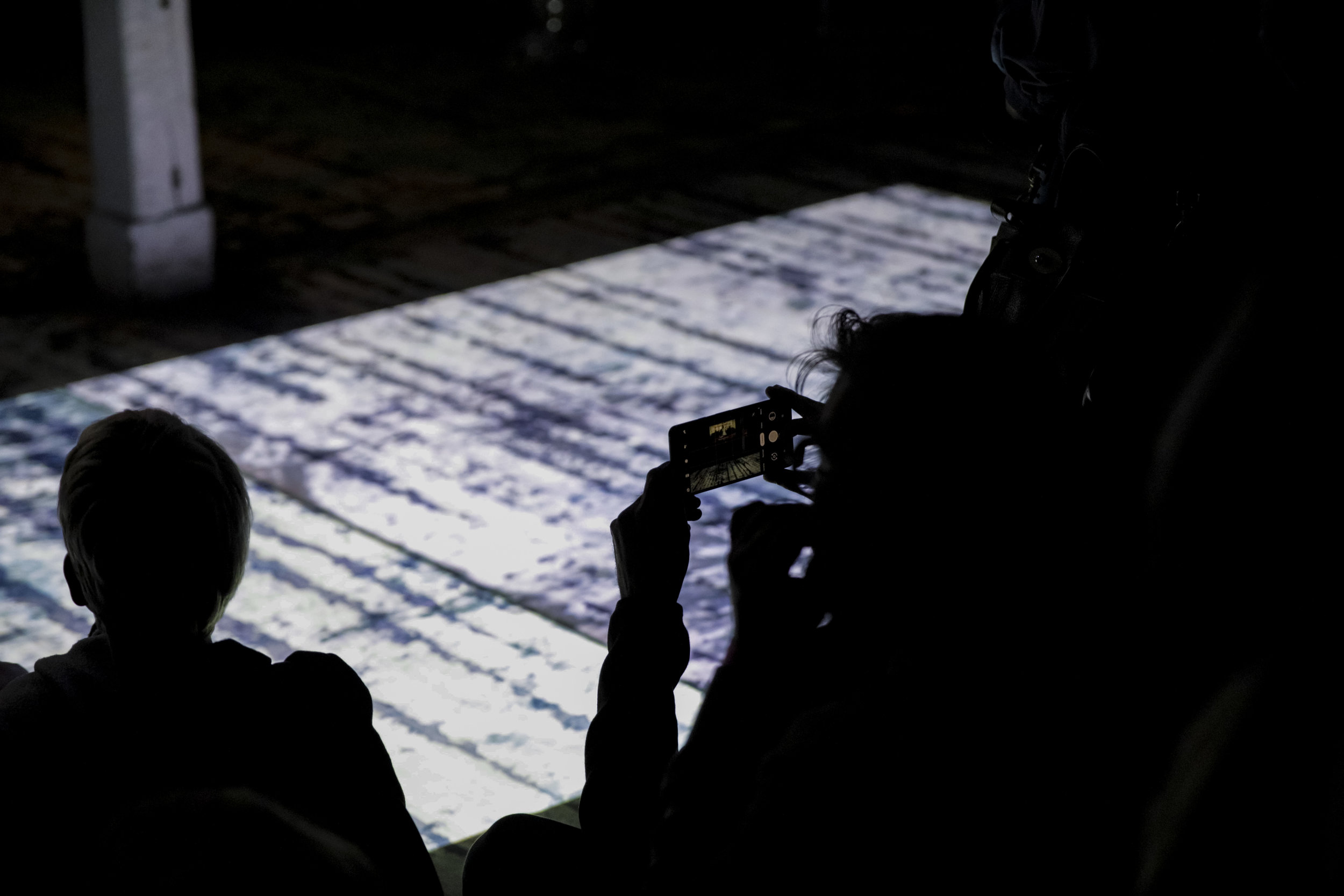
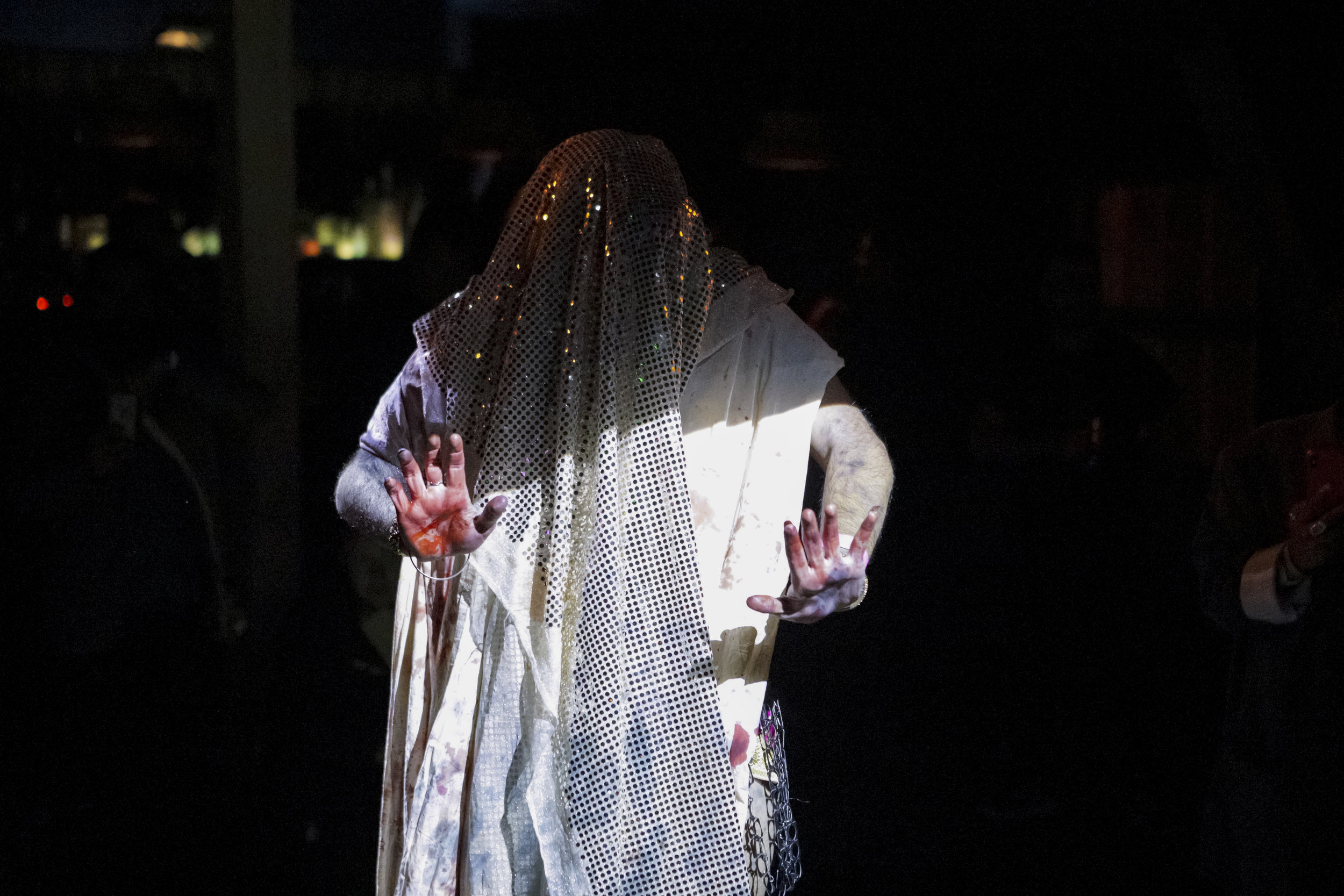
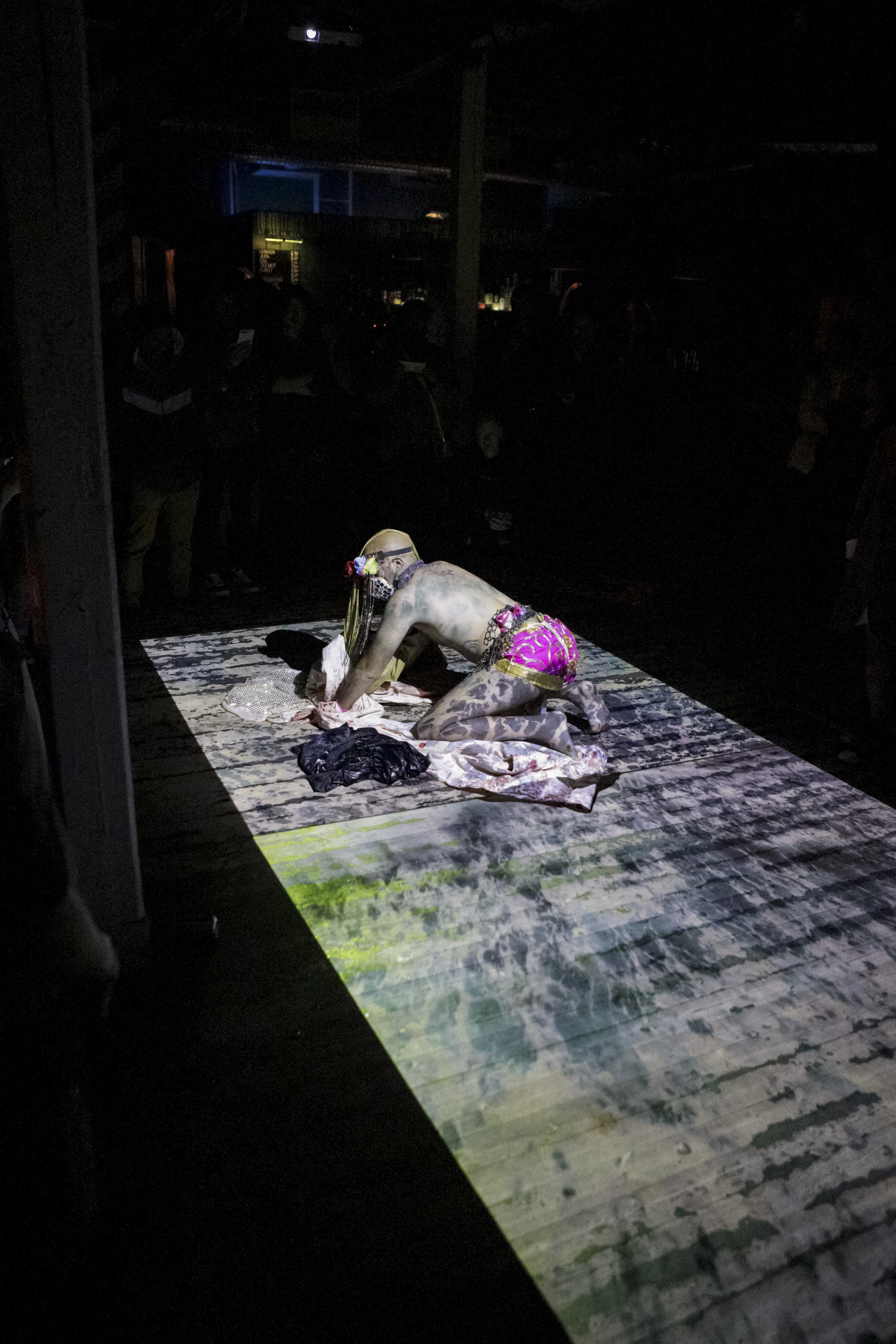
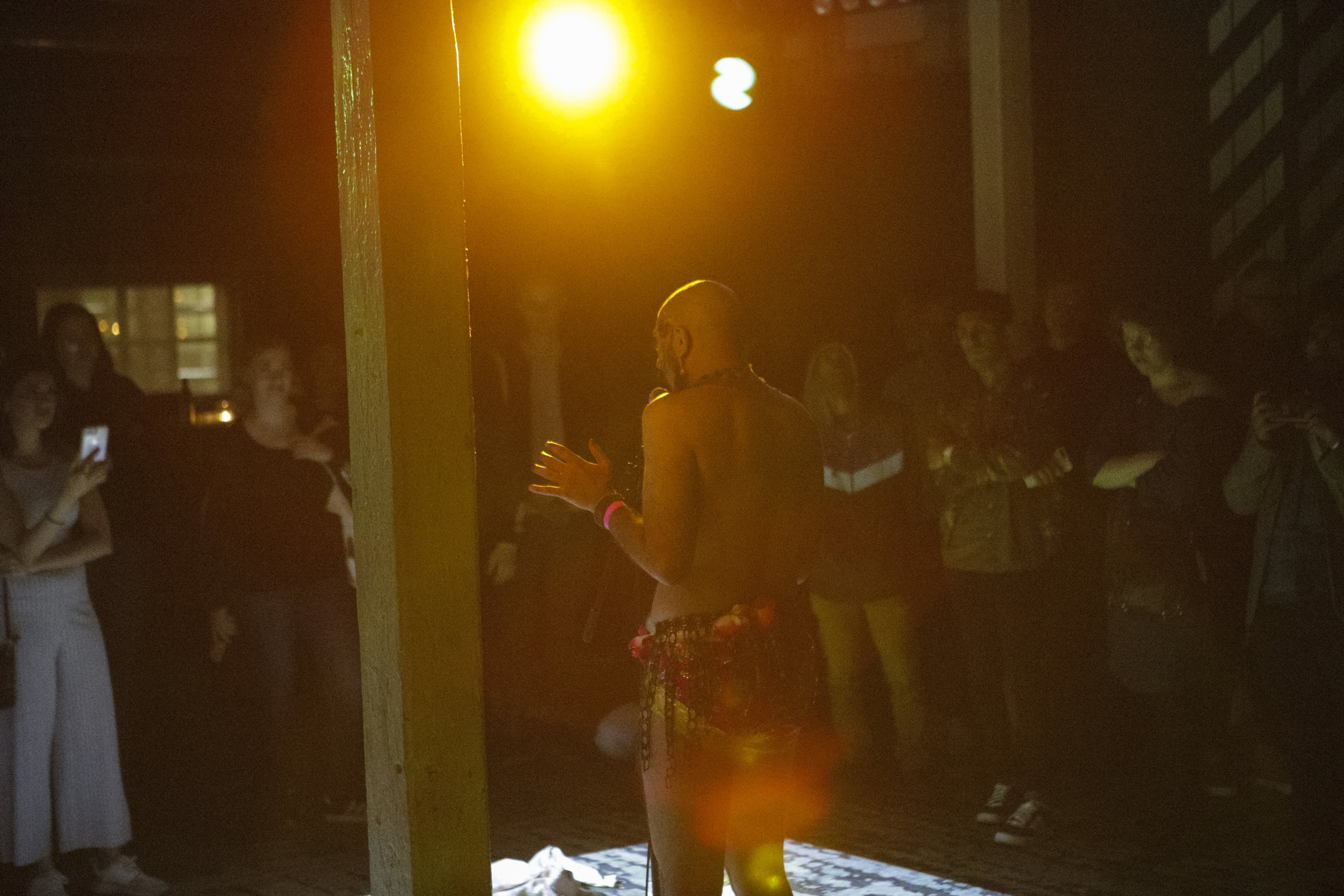

Chapter 2: The Darkroom
Organized virtually, in collaboration with Gay Sauna Vogue, Helsinki, and Centre for Feminist Research, York University, Toronto, Chapter 2: The Darkroom examines critical views on cruising, erotic spaces, and liberatory sexual practice from queer, Muslim, and BIPOC perspectives
28 – 31 October 2020
The program includes artistic contributions, films, and talks, featuring:
Tamara Al-Mashouk, Morehshin Allahyari, Lina Bembe & Max Disgrace, Zulfikar Ali Bhutto, Mustafa Boga, Yara El Safi, Sunil Gupta, Jaya Jacobo, Abdi Osman, Blake Paskal, Hadi Rehman, Anthony Rosado, Queering Space x Amani Saeed, Umair Sajid, Begum Taara Shakar, and Derrick Woods-Morrow.
Tamara Al-Mashouk, Morehshin Allahyari, Lina Bembe & Max Disgrace, Zulfikar Ali Bhutto, Mustafa Boga, Yara El Safi, Sunil Gupta, Jaya Jacobo, Abdi Osman, Blake Paskal, Hadi Rehman, Anthony Rosado, Queering Space x Amani Saeed, Umair Sajid, Begum Taara Shakar, and Derrick Woods-Morrow.
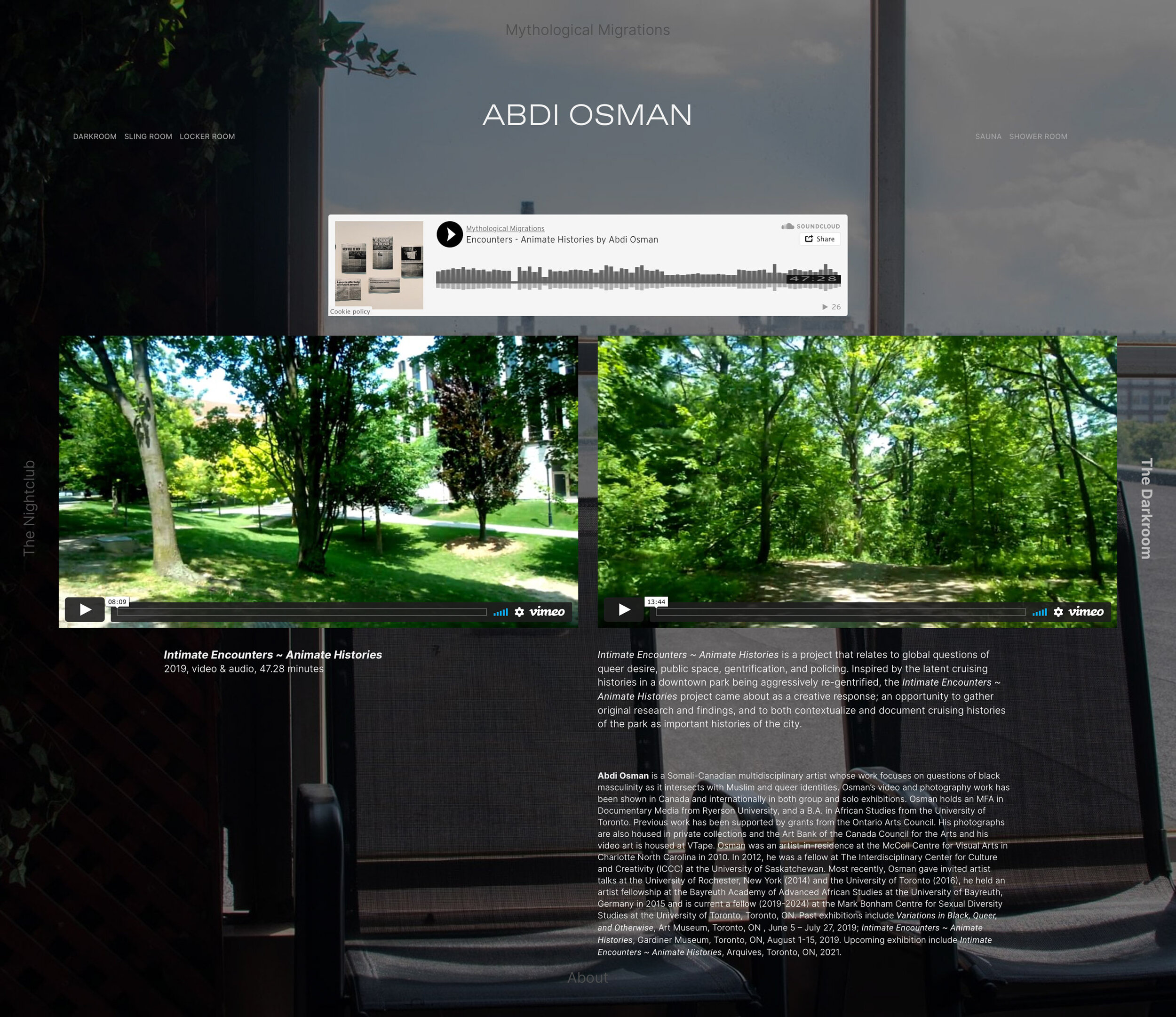











Chapter 2: The Darkroom
Talk Schedule
October 28
16:00 EET; 10:00 EST
Chapter 2: The Darkroom
Introduction
Abdullah Qureshi
Hosted by the Centre for Feminist Research, York University, Toronto. Co-Sponsored by The School of Gender, Sexuality and Women's Studies, The Sexuality Studies Program, and School of the Arts, Media, Performance & Design
17:00 EET; 11:00 EST
Artist Panel
Queerness Elsewhere
Hadi Rehman, Begum Taara Shakar, and Umair Sajid in conversation with Abdullah Qureshi
18:30 EET; 12:30 EST
Artist Panel
Unraveling and Revealing: Intimate Encounters
Abdi Osman and Yara El Safi in conversation with Zulfikar Ali Bhutto
Hosted by the Centre for Feminist Research, York University, Toronto. Co-Sponsored by The School of Gender, Sexuality and Women's Studies, The Sexuality Studies Program, and School of the Arts, Media, Performance & Design
October 29
17:00 EET: 11:00 EST
Queering Space x Amani Saeed
Ihsan, a spoken word performance and conversation
18:30 EET: 12:30 EST
Panel Discussion
Much Handled Things Are Always Soft
Derrick Woods-Morrow, Blake Paskal, and Anthony Rosado in conversation with Tamara Al-Mashouk
16:00 EET; 10:00 EST
Chapter 2: The Darkroom
Introduction
Abdullah Qureshi
Hosted by the Centre for Feminist Research, York University, Toronto. Co-Sponsored by The School of Gender, Sexuality and Women's Studies, The Sexuality Studies Program, and School of the Arts, Media, Performance & Design
17:00 EET; 11:00 EST
Artist Panel
Queerness Elsewhere
Hadi Rehman, Begum Taara Shakar, and Umair Sajid in conversation with Abdullah Qureshi
18:30 EET; 12:30 EST
Artist Panel
Unraveling and Revealing: Intimate Encounters
Abdi Osman and Yara El Safi in conversation with Zulfikar Ali Bhutto
Hosted by the Centre for Feminist Research, York University, Toronto. Co-Sponsored by The School of Gender, Sexuality and Women's Studies, The Sexuality Studies Program, and School of the Arts, Media, Performance & Design
October 29
17:00 EET: 11:00 EST
Queering Space x Amani Saeed
Ihsan, a spoken word performance and conversation
18:30 EET: 12:30 EST
Panel Discussion
Much Handled Things Are Always Soft
Derrick Woods-Morrow, Blake Paskal, and Anthony Rosado in conversation with Tamara Al-Mashouk
October 30
17:00 EET: 11:00 EST
Artist Talk
Sun City and Beyond
Sunil Gupta
18:30 EET; 12:30 EST
Panel Discussion
Trans and Femme Perspectives on Art, the Erotic, and Representation
Jaya Jacobo, Lina Bembe & Max Disgrace in conversation with Danai Anagnostou
October 30
17:00 EET; 11:00 EST
Artist Panel
Reversing the Orientalist Gaze
Tamara Al-Mashouk, Mustafa Boga, and Zulfikar Ali Bhutto in conversation with Abdullah Qureshi
18:30 EET: 12:30 EST
Conclusion
On process, organization and collaboration
Abdullah Qureshi & Danai Anagnostou in conversation with Mira Kallio-Tavin
17:00 EET: 11:00 EST
Artist Talk
Sun City and Beyond
Sunil Gupta
18:30 EET; 12:30 EST
Panel Discussion
Trans and Femme Perspectives on Art, the Erotic, and Representation
Jaya Jacobo, Lina Bembe & Max Disgrace in conversation with Danai Anagnostou
October 30
17:00 EET; 11:00 EST
Artist Panel
Reversing the Orientalist Gaze
Tamara Al-Mashouk, Mustafa Boga, and Zulfikar Ali Bhutto in conversation with Abdullah Qureshi
18:30 EET: 12:30 EST
Conclusion
On process, organization and collaboration
Abdullah Qureshi & Danai Anagnostou in conversation with Mira Kallio-Tavin

Supported by
